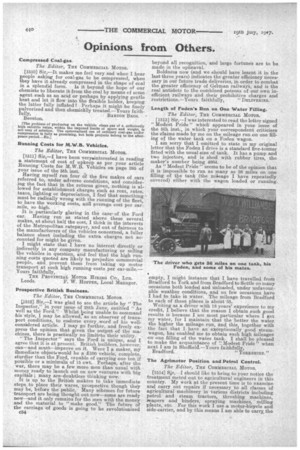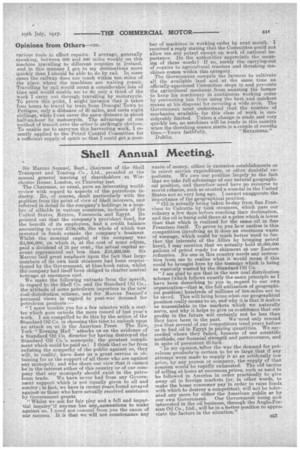Opinions from Others.
Page 16

Page 17

If you've noticed an error in this article please click here to report it so we can fix it.
Compressed Coal-gas.
The Editor, THE COMMERCIAL MOTOR.
j1510] Sir,—It makes me feel very sad when I hear people asking for coal-gas to be compressed, when they have it already compressed in the shape of coal in a splendid form. Ls it beyond the hope of our chemists to liberate it from the coal by means of some agent snch as an acid or perhaps by applying gentle heat and let it flow into the flexible holder, keeping the latter fully inflated? Perhaps it might be finely pulverized and then chemically treated.—Yours BARTON BROS. Beeston.
[The problem of produaing on the vehicle clean gas of a sufficiently high calorific value, within the imposed limits of space and weight, is not easy of solution. The systematized use of ordinary coal-gas under compression is fully as promising, but both projects belong to the afterpeace period. –En.] Running Costs for M.W.B. Vehicles.
The Editor, THE COMMERCIAL MOTOR.
[1511]-Sir,—I have been veryainterested in reading a statement of cost of upkeep as per your article Running Costs for M.W.B. Vehicles on page 395 of your issue of the 5th inst.
Having myself run four Of the five makes of cars referred to, under adverse conditions, and considering the fact that in the returns given, nothing is allowed for establishment charges such as rent, rates, taxes, lighting or depreciation, I feel that something must be radically wrong with the running of the fleet, to have the working costs, add a,verage cost per carmile, so high.
It is particularly glaring in the caseof the Ford car. Having run as stated above these several makes' at about half the cost, I think in the interests of the Metropolitan ratepayer, and out of fairness to the manufacturers of the vehicles concerned, a fuller balance sheet including the extra charges not aceounted for might be given. I might state that I have no interest directly or indirectly in any company manufacturing or selling The vehicles in question, and feel that the high running costs quoted are likely to prejudice commercial people, and prevent them from taking up motor transport at such high running costs per car-mile.Yours faithfully,
THE PROVINCIAL MOTOR HIRING CO., LTD.
Leeds. F. W. HOPPER, Local Manager.
Prospective British Business.
The Editor, THE COMMERCIAL MOTOR.
1,1512] Sir,—I was glad to see the article by "The Inspector," in your issue of 28th June, entitled " As well as the Ford.' Whilst being unable to command his style I may be allowed7as an observer of transport conditions, to endorse every word of his wellconsidered article. I may go further, and freely express the opinion that given the output of the machines, there is practically no limit:to their utility.
'The Inspector" says the Ford is unique, and I agree that it is at present. British builders, however, can—and must—improve on it. Were I a maker, my Thimediate object, would be a £100 vehicle, complete, sturdier than the Ford, capable of carrying one ton if possible or a minimum of 15 cwt. Perhaps, after the war, there may be a feu more men than usual with money ready to launch out on new ventures with big capitals ; many are-doubtless thinking now. It is up to the British makers to take immediate steps to place their wares, prospective though they may be, before the public. Many schemes for future transport are being thought out now—some are ready now—and it only remains for the men with the money and the material to "make good." The future of the carriage of goods is going to be revolutionized
beyond all recognition, and large fortunes are to be made in the upheaval. Boldness now (and we should have learnt it in the last three years) indicates the greater efficiency necessary in our future trade deliveries, in. order to combat the greater efficiency of German railways, and is the real antidote to the combined poisons of our own inefficient railways and ,their prohibitive charges and restrictions.—Yours faithfully, " DELIVERIES.
Length of Foden 's Run on One Water Filling.
The Editor, THE COMMERCIAL MOTOR.
[1513] Sir,—I was interested to read the letter signed "Modest Pride" which appeared in your issue of the 5th inst.' in which your correspondent criticises the claims made by me on the mileage run on one filling of the water tank on a Foden wagon.
I am sorry that I omitted to state in my original letter that the Foden I drive is a standard five-tonner fitted with the usual size of tank. It has a pump and two injectors, and is shod with rubber tires, the maker's number being 4664.
As "Modest Pride" seems to be of the opinion that it is impossible to run as many as 36 miles on one filling of tbe tank (the mileage I have repeatedly covered) either with the wagon loaded or running empty, I might instance that I have travelled from Bradford to York and from Bradford to Settle on many occasions both loaded and unloaded, under unfavourable weather conditions, and on few occasions have I had to take in water. The mileage from Bradford to each of these places is about-'35. Writing as a driver with 18 years' experience to my credit, I believe that the reason I obtain such good results is because I am most particular where I get my water, for I maintain that the better the water the higher the mileage run, -and this, together with the fact that I have an exceptionally good steamwagon, has enabled me to obtain such high mileages on one filling of the water tank. I shall be pleased to make the acquaintance of Modest Pride" when next I am in Shoffield.—Yours faithfully, Bradford. "YORKSHIRE."
The Agrimotor Position and Petrol Control.
The Editor, THE COMMERCIAL MOTOR.
[15141 should like to bring to your notice the
_treatment meted out to agricultural engineers in this country. My work at the present time is to examine and carry out repairs if necessary to all classes of agricultural machinery in various districts including petrol and steam tractors, threshing machines, reapers and binders, spraying machines, milling plants, etc. For this work I use a motor-bicycle and side-carrier, and by this means I am able to carry the various tools to effect repairs. I average, -generally speaking, between 600 and 800 miles weekly on this machine travelling to different counties in Ireland, and in this manner I get to my destinations more quickly than I shoukl be able to do by rail. In some cases the railway does not touch within ten. miles of the place where the machines are waiting repair. Travelling by rail would mean .a considerable loss of time and would ena.ble me to do only a third of the work I carry out through travelling by motorcycle. To prove this point, I might instance that it takes four hours to travel by train from Donegal Ton to Pettigoe, only a distance of o miles, and costs eight shillings, while lean cover the same distance in about half-an-hour by motorcycle. The advantage of one method of transit over the other•is strikingly obvious. To enable me to earrymn this harvesting work, I recently applied to the Petrol Control Committee for a sufficient supply of spirit so that I could geta, num ber of machines in working order by next month. I received a reply stating that the Committee Quaid not allow me any petrol except on work of national importance. Do the authorities appreciate the meaning of these words ? If so, surely the carrying-out of repairs to agricultural tractors and threshing machines comes within this category.
The Government compels the farmers to cultivate all the available land and at the same time an officially-appointed Committee steps in and prevents the agricultural mechanic from assisting the farmer to keep his machinery in continuous working order by preventing him from using the best and quickest means at his disposal for covering a wide area The Government must understand that the number of mechanics available for this class of work is considerably limited. Unless a change is made and very quickly too_, no machines will be ready in this country -when the threshing season starts in a couple of months
time.—Yours faithfully, " REPAIRER5."




















